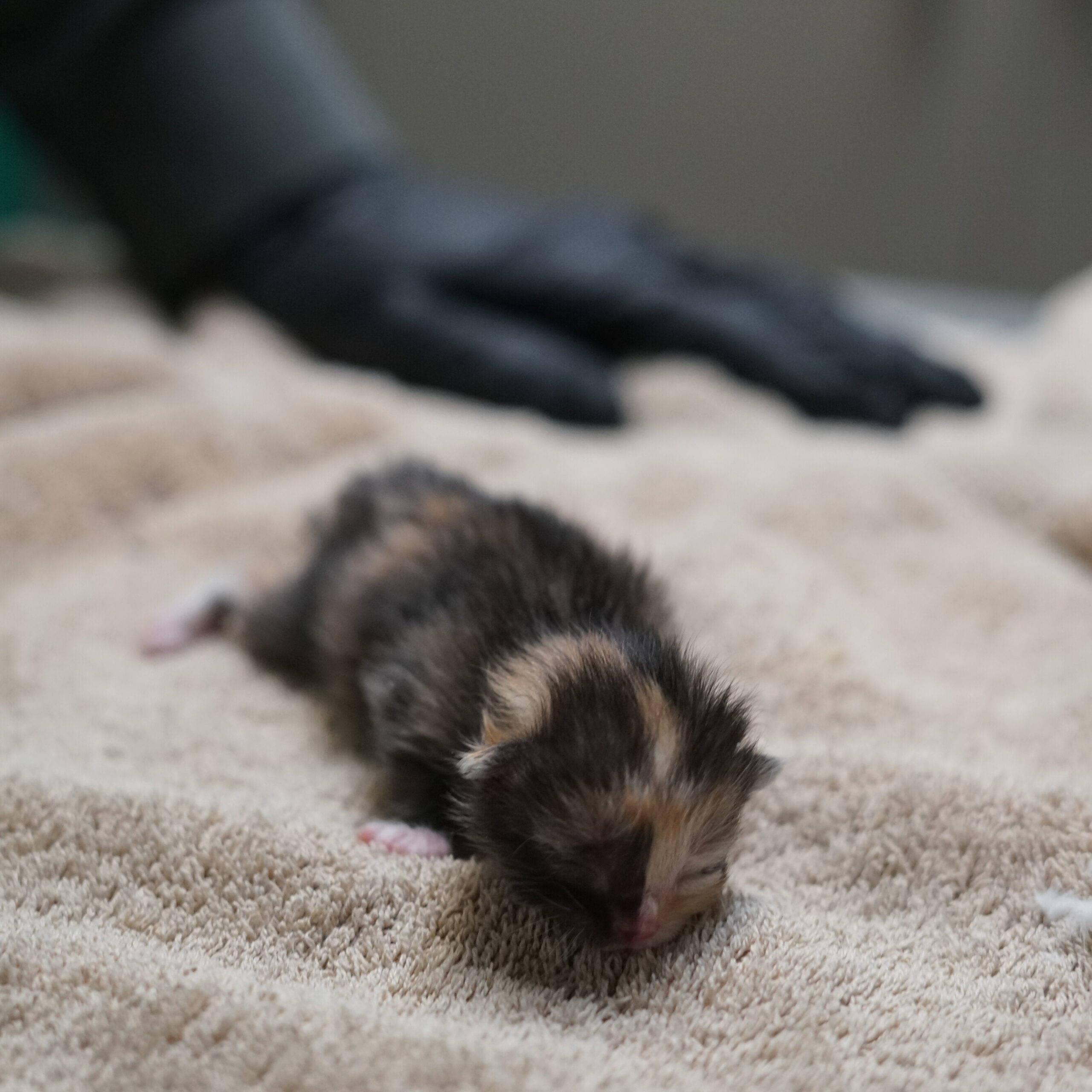Sign up for our Mewsletter!
Kitten
Season
Shelters receive an influx of newborn kittens in the warmer months, which can create strains on resources. We explore big and small ways you can help in our latest blog.
Nibbles &
Kibbles
Cat Care Society’s emergency food bank offers cat food and supplies to people experiencing temporary financial challenges. Open 1st and 3rd Saturdays, 10 a.m. to noon.
Our Mission
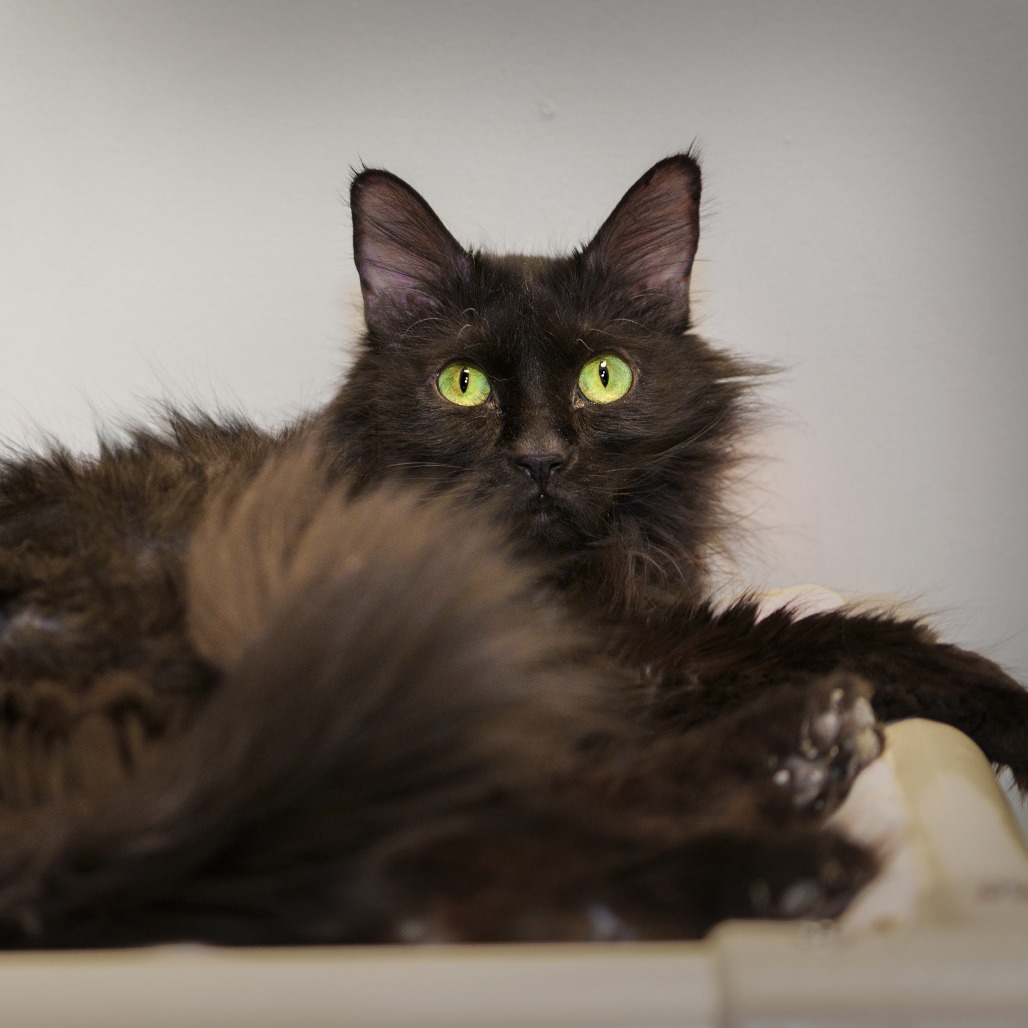
Meet
Olive
Lonely Hearts Club Member
Olive is a spunky 7-year-old diabetic cat. With a mischievous personality, she’s quickly become a favorite amongst the staff at CCS. If you adopt Olive, we assure you there will never be a dull day in your household again! View her profile to learn more.
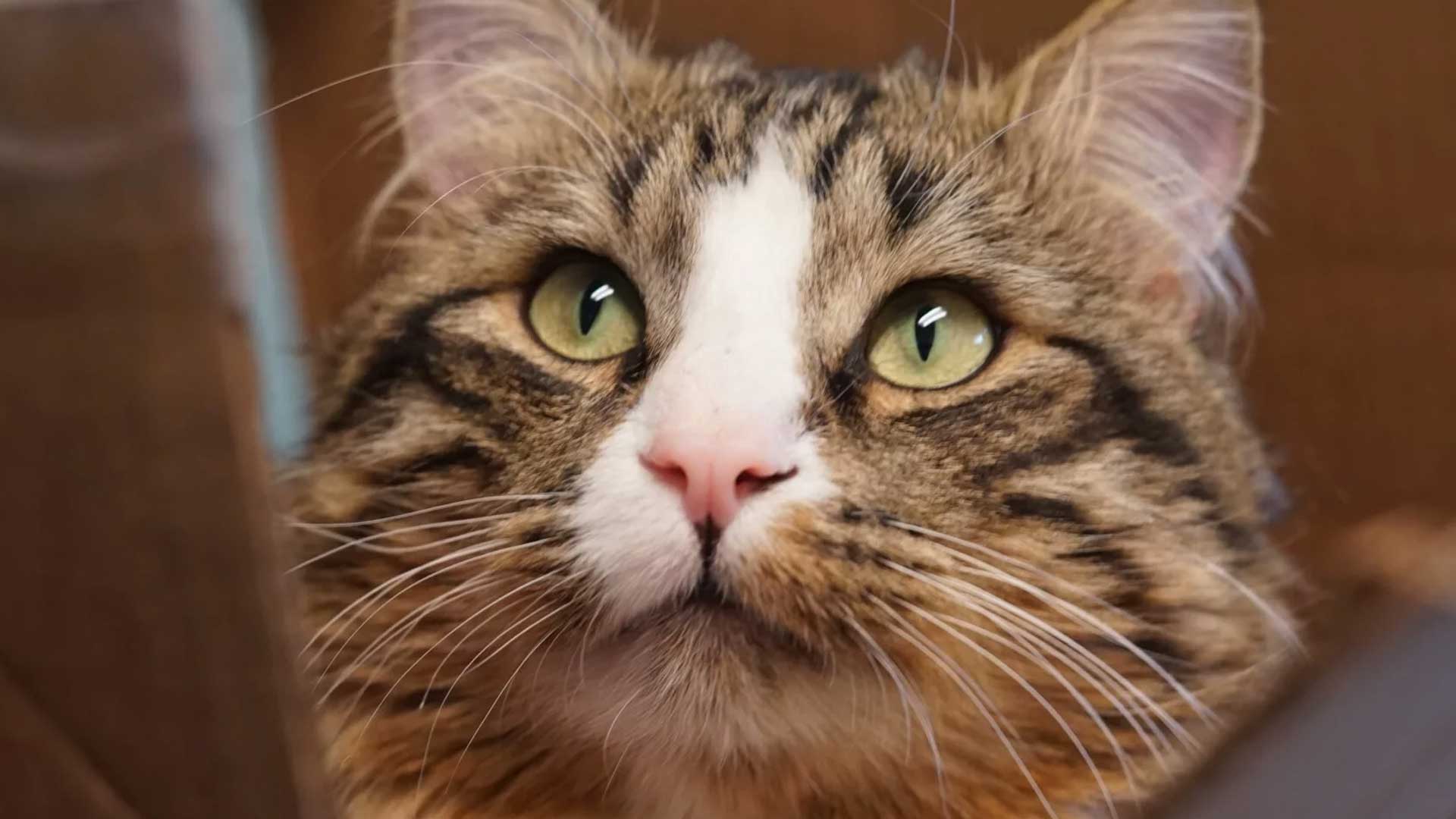
Adopt
Save a life and find your new best friend while opening up more space in the shelter. After picking out your purrfect match, apply to adopt!
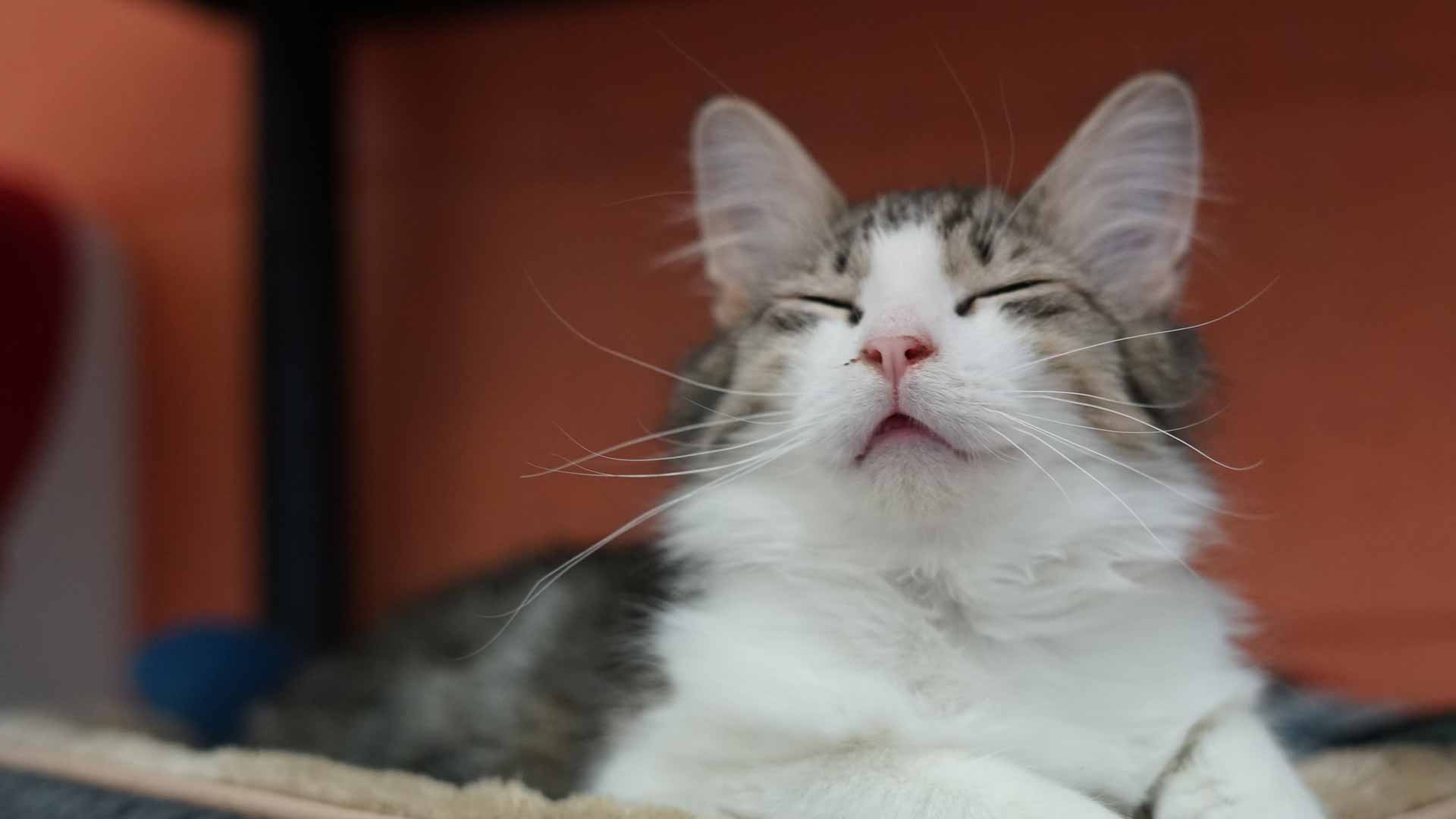
Foster
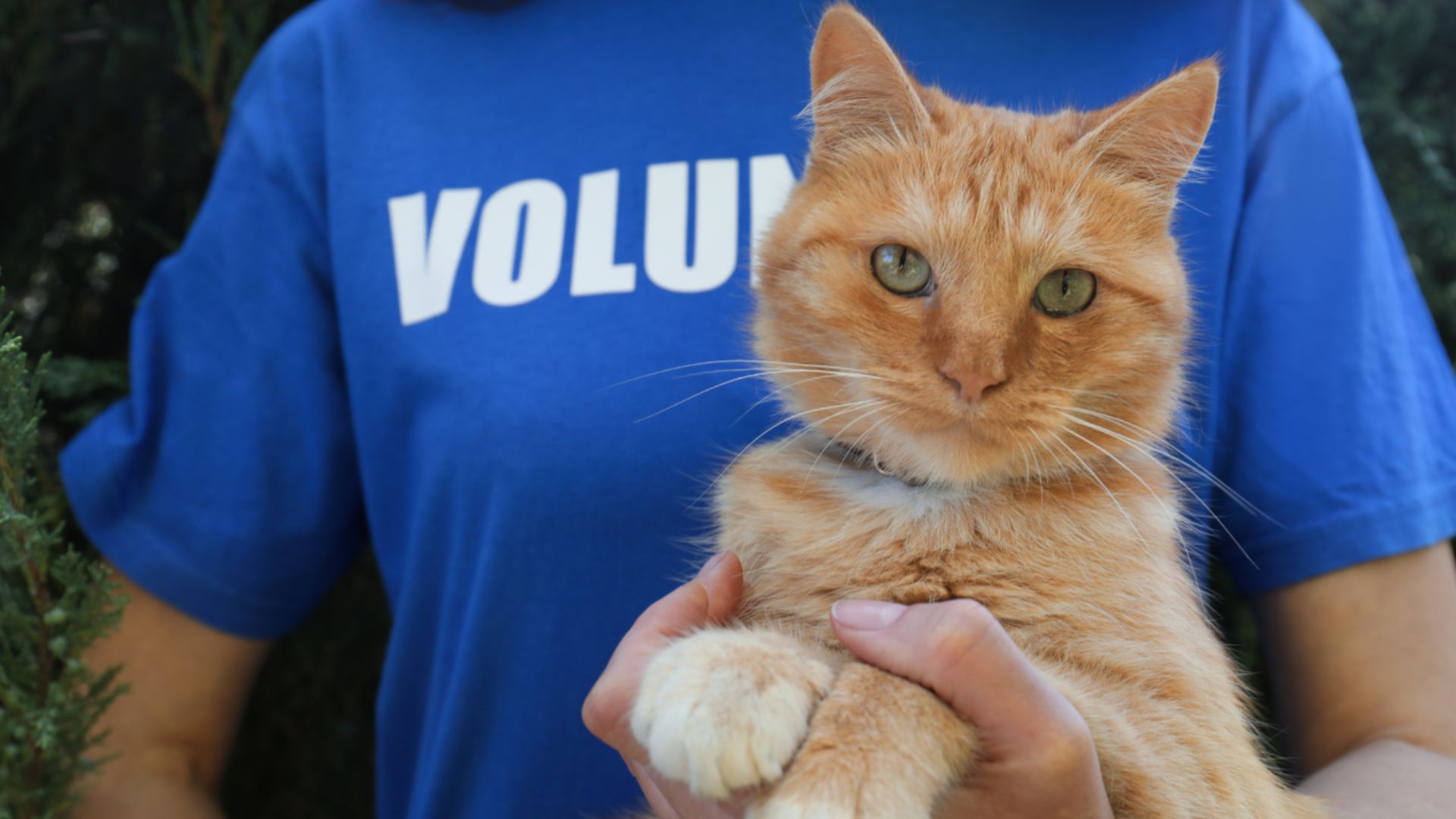
Volunteer
Get involved by giving back! We have many volunteer roles available to help support the cats in our shelter. A few hours can make a world of difference.
Upcoming Events

Tails of the Painted Cats
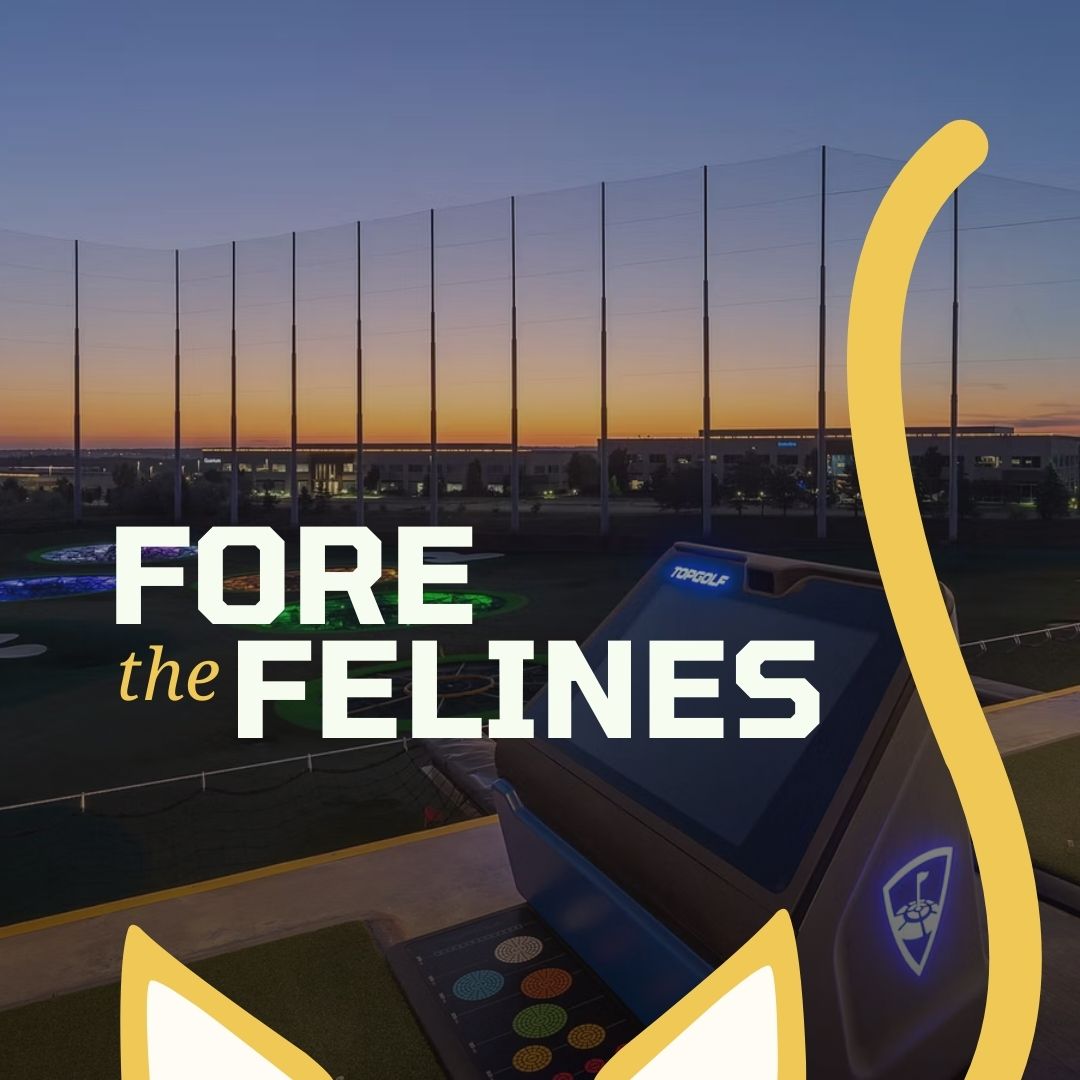
Fore the Felines at Topgolf
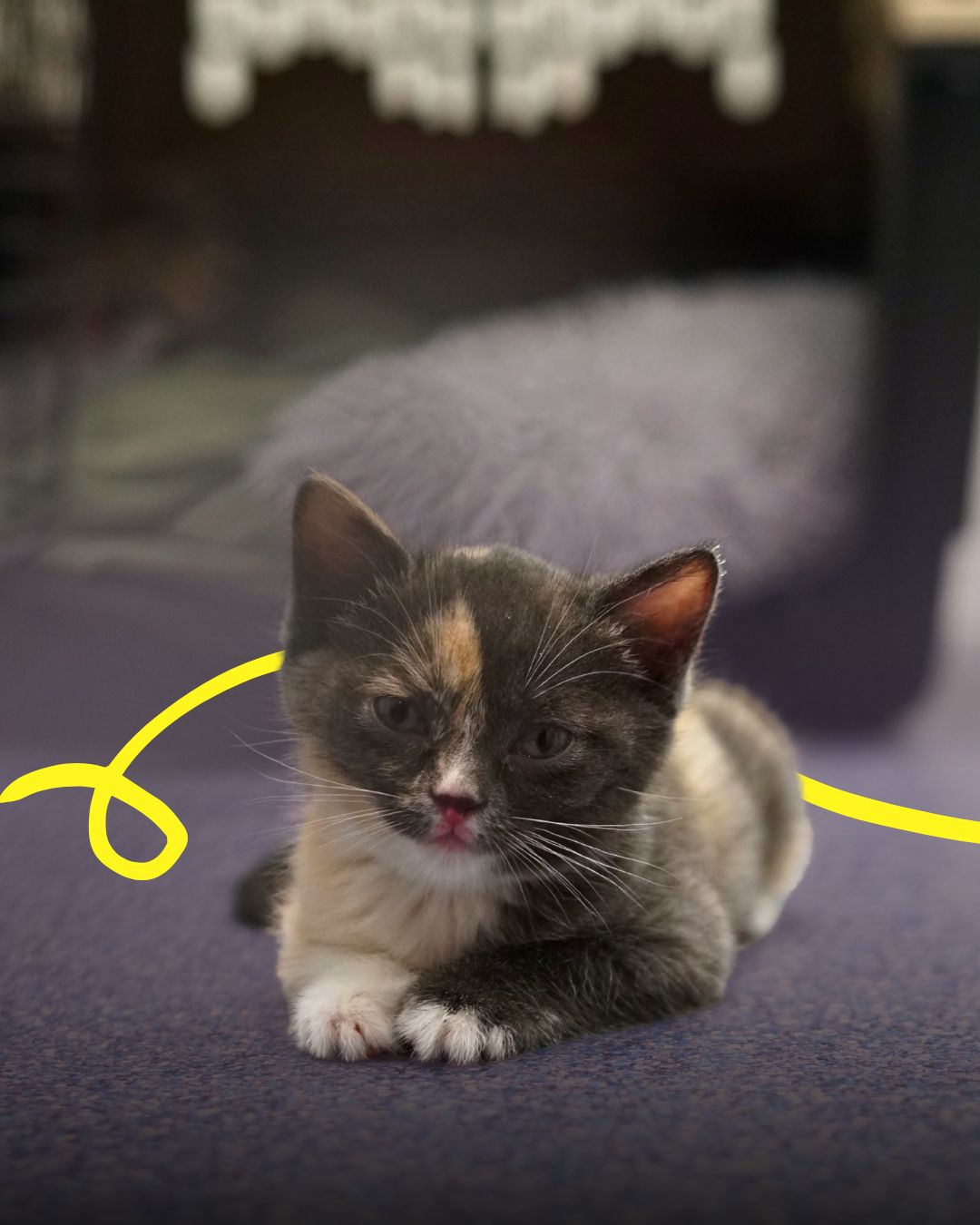
Kitten Shower

Cat Takeover at New Terrain Brewing Co.

Santa Paws
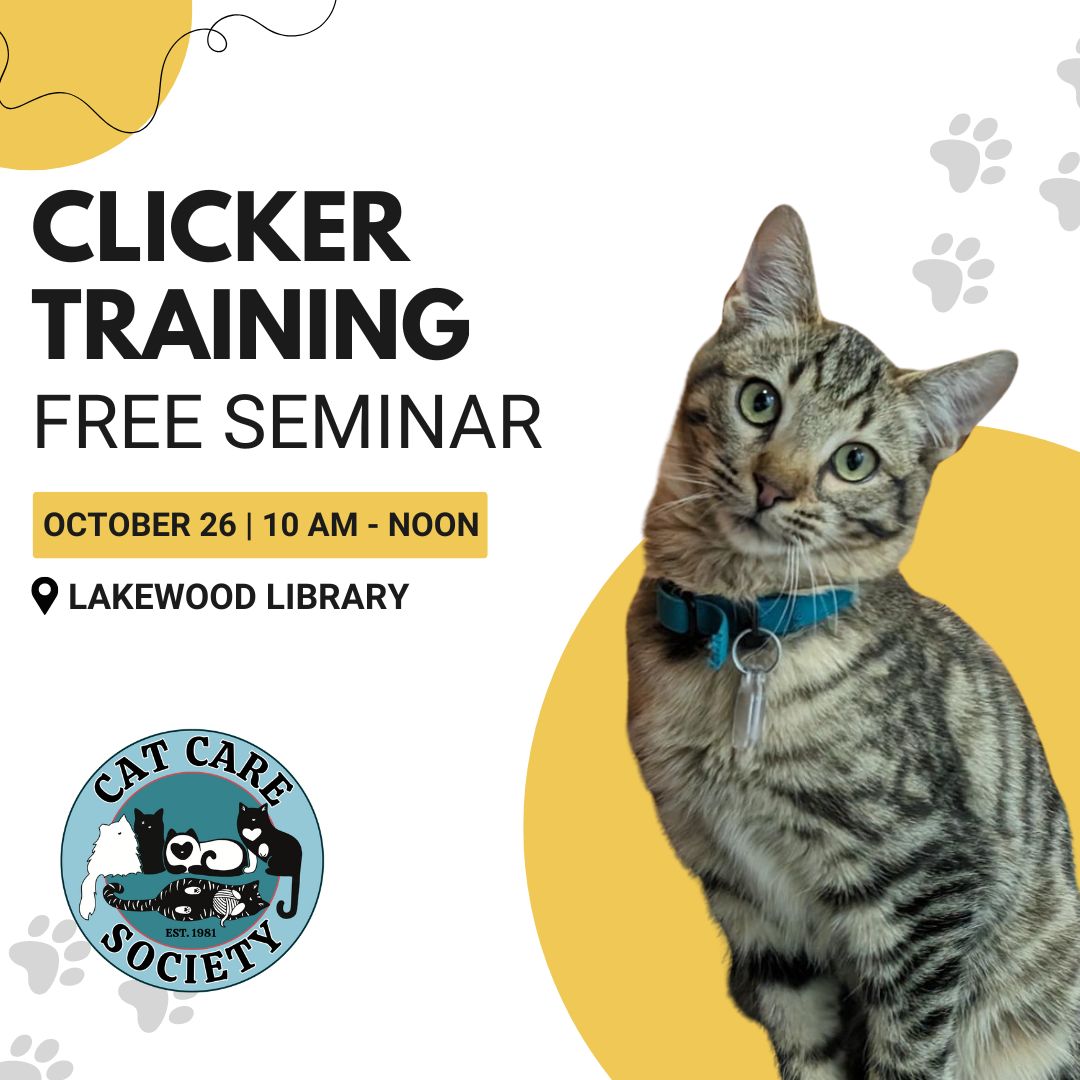
Seminar: Clicker Training Your Cats
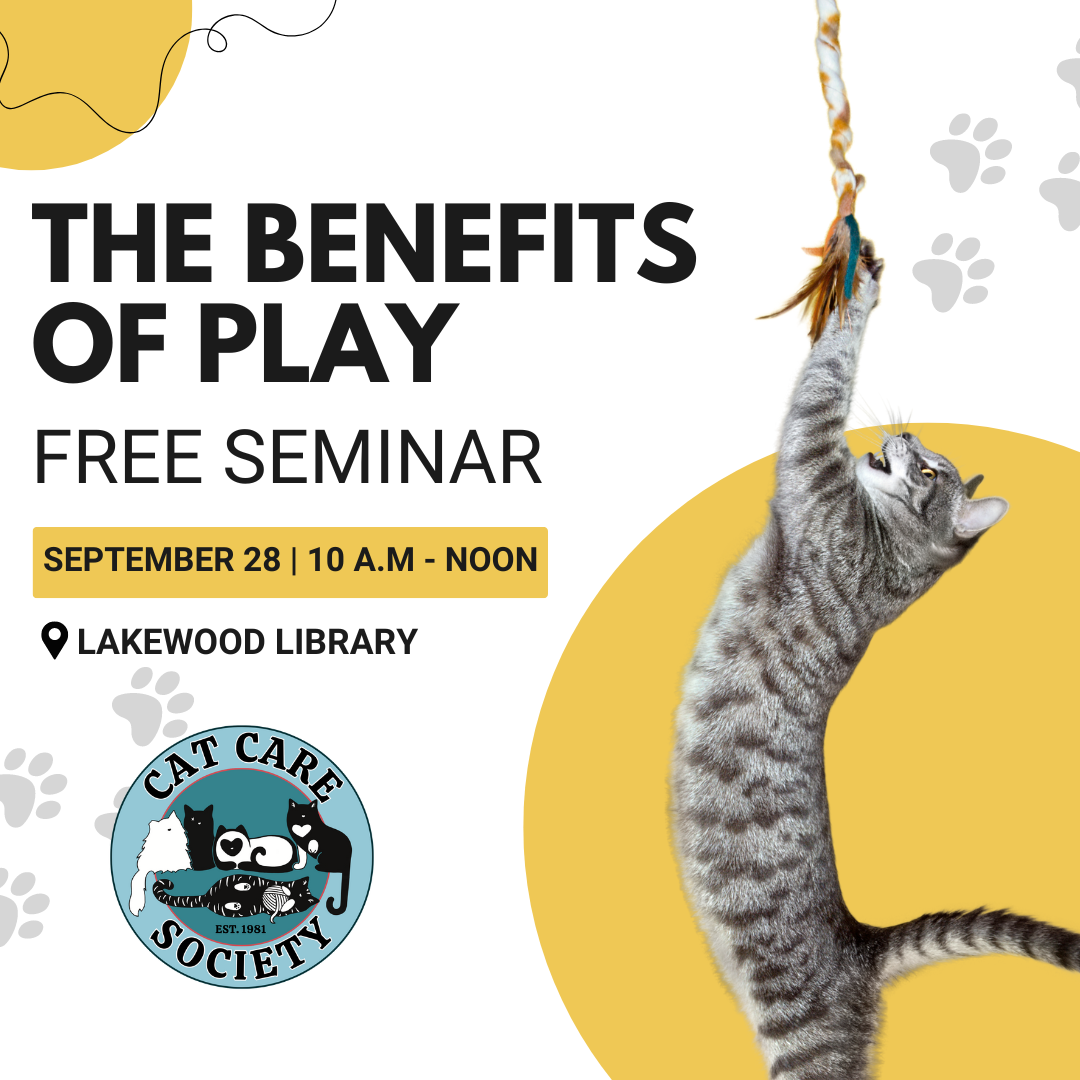
Seminar: The Benefits of Play
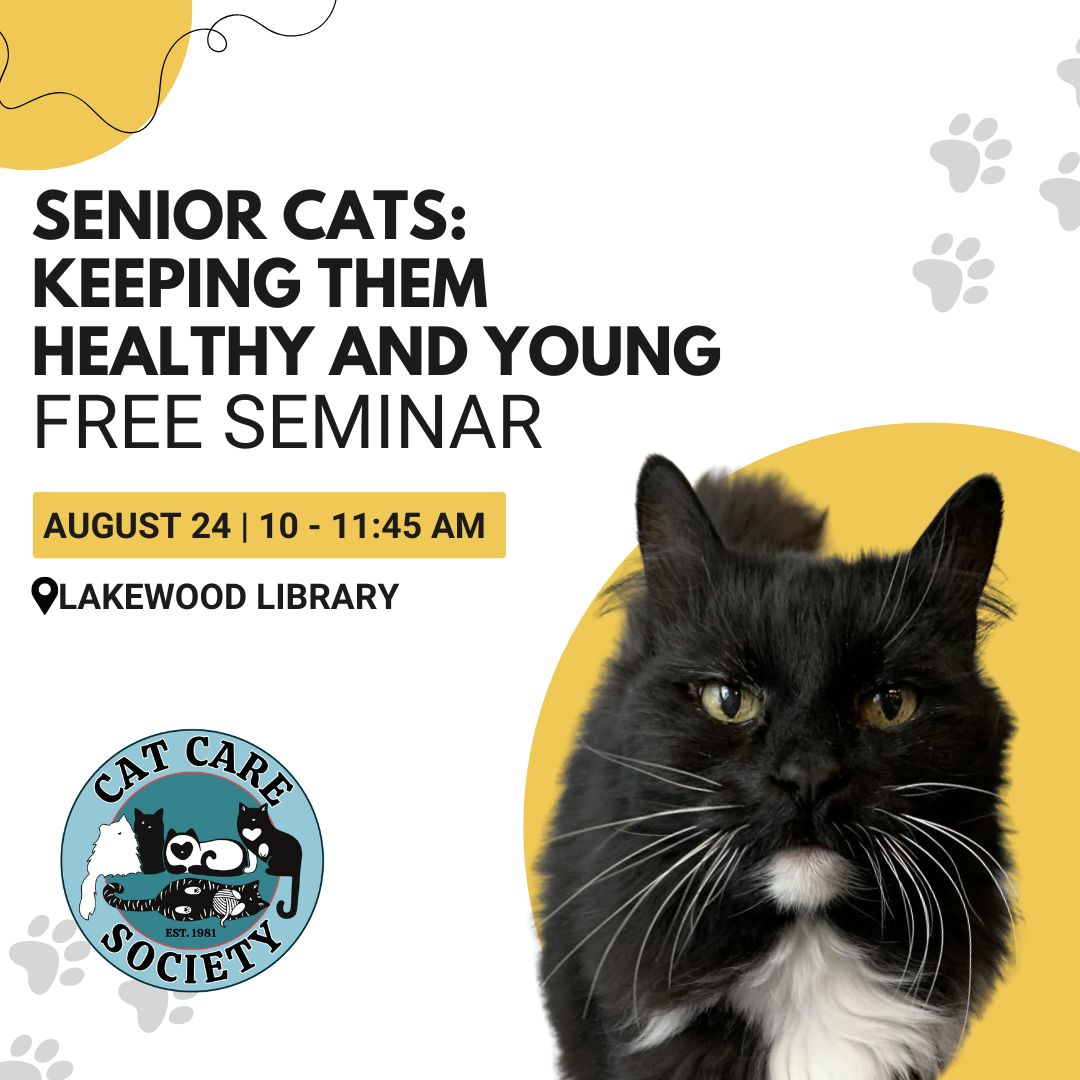
Seminar: Keeping Senior Cats Healthy & Young
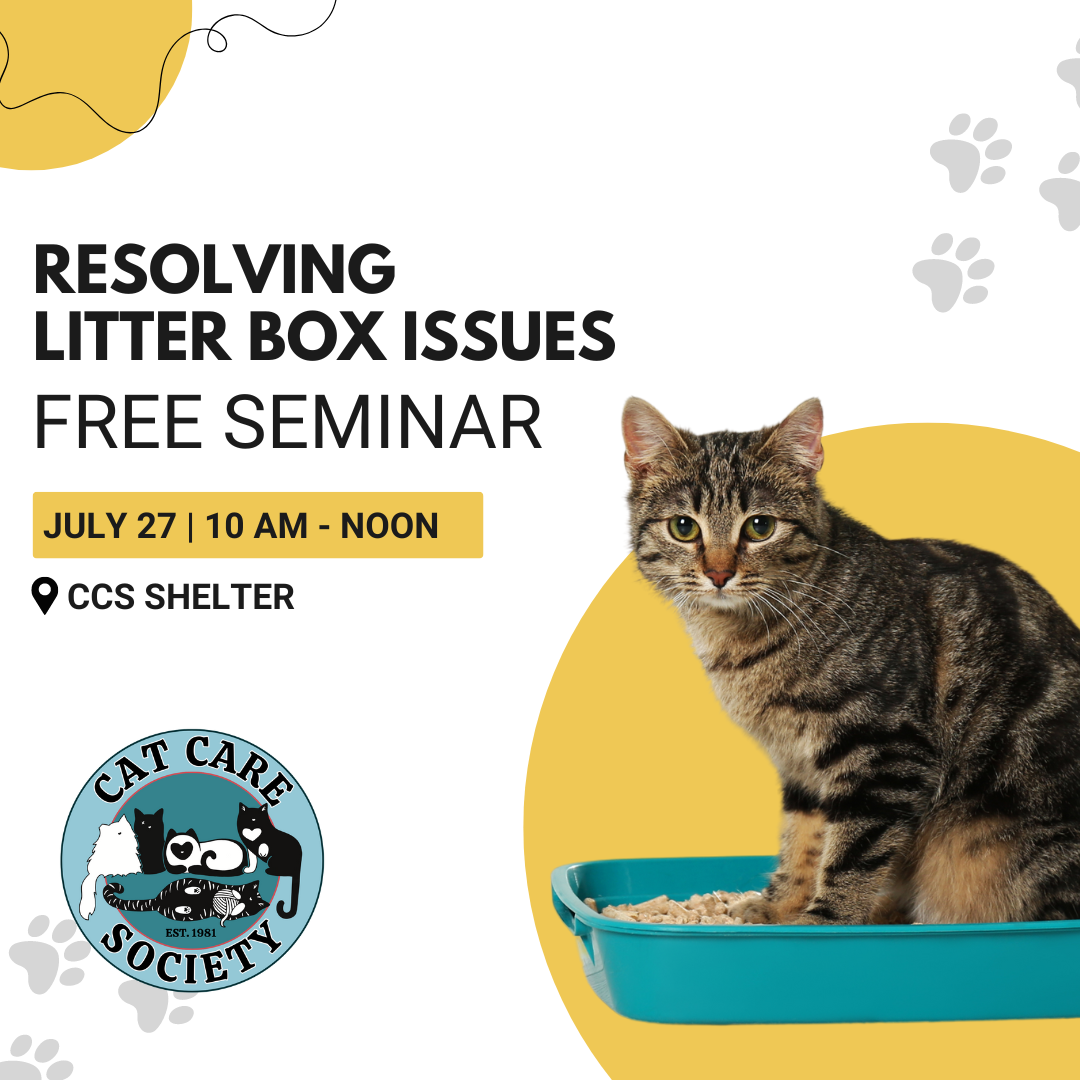
Seminar: Resolving Litter Box Issues

Summer Art Auction (Online)
- Ends August 9, 2024
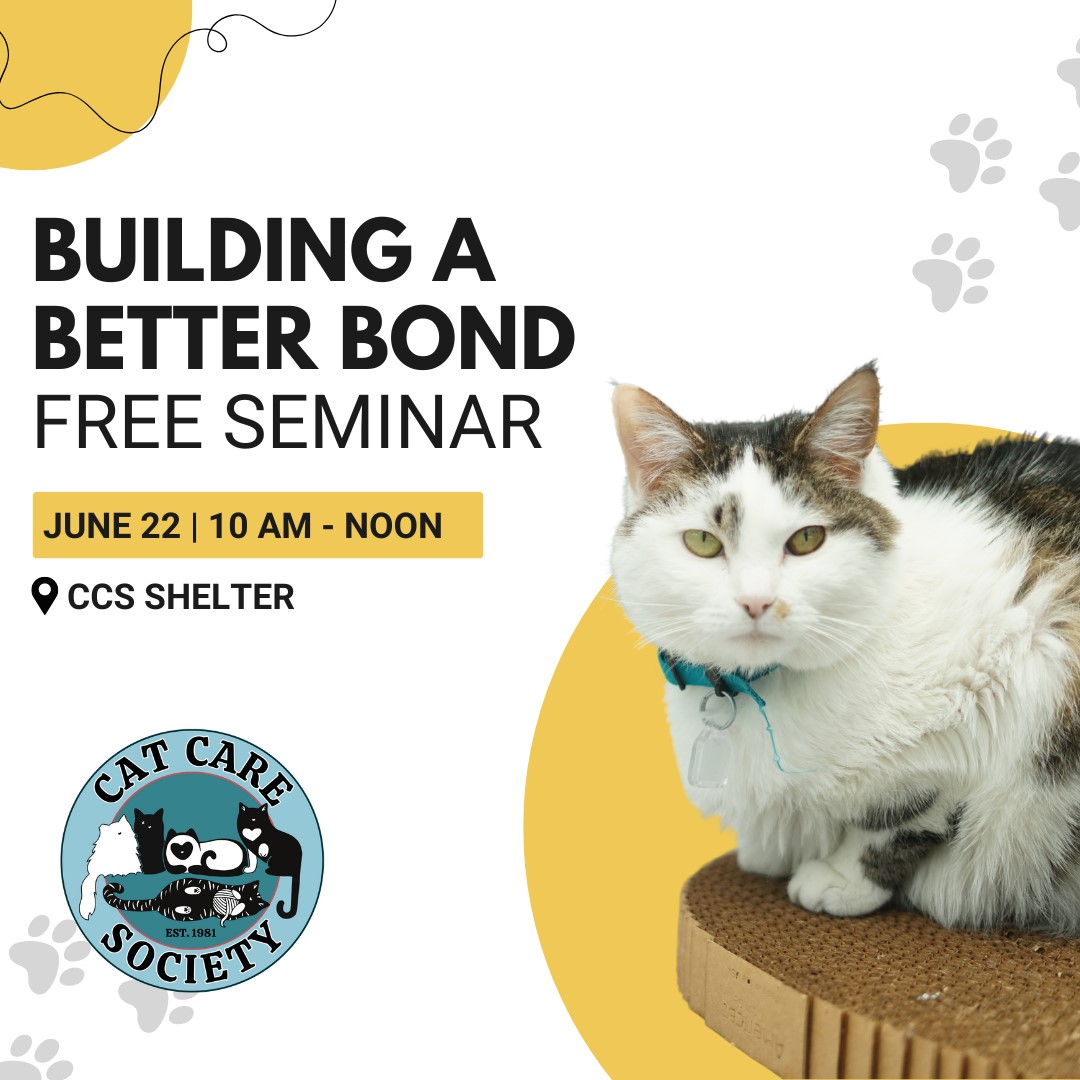
Seminar: Building a Better Bond with Your Kitty
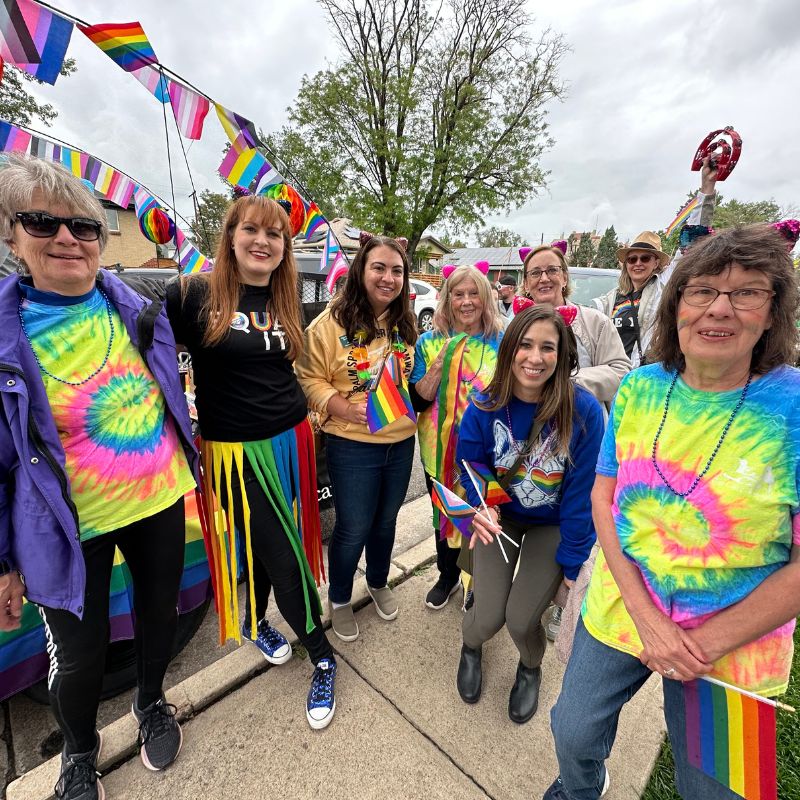
CCS @ Denver PrideFest
- Ends June 23, 2024
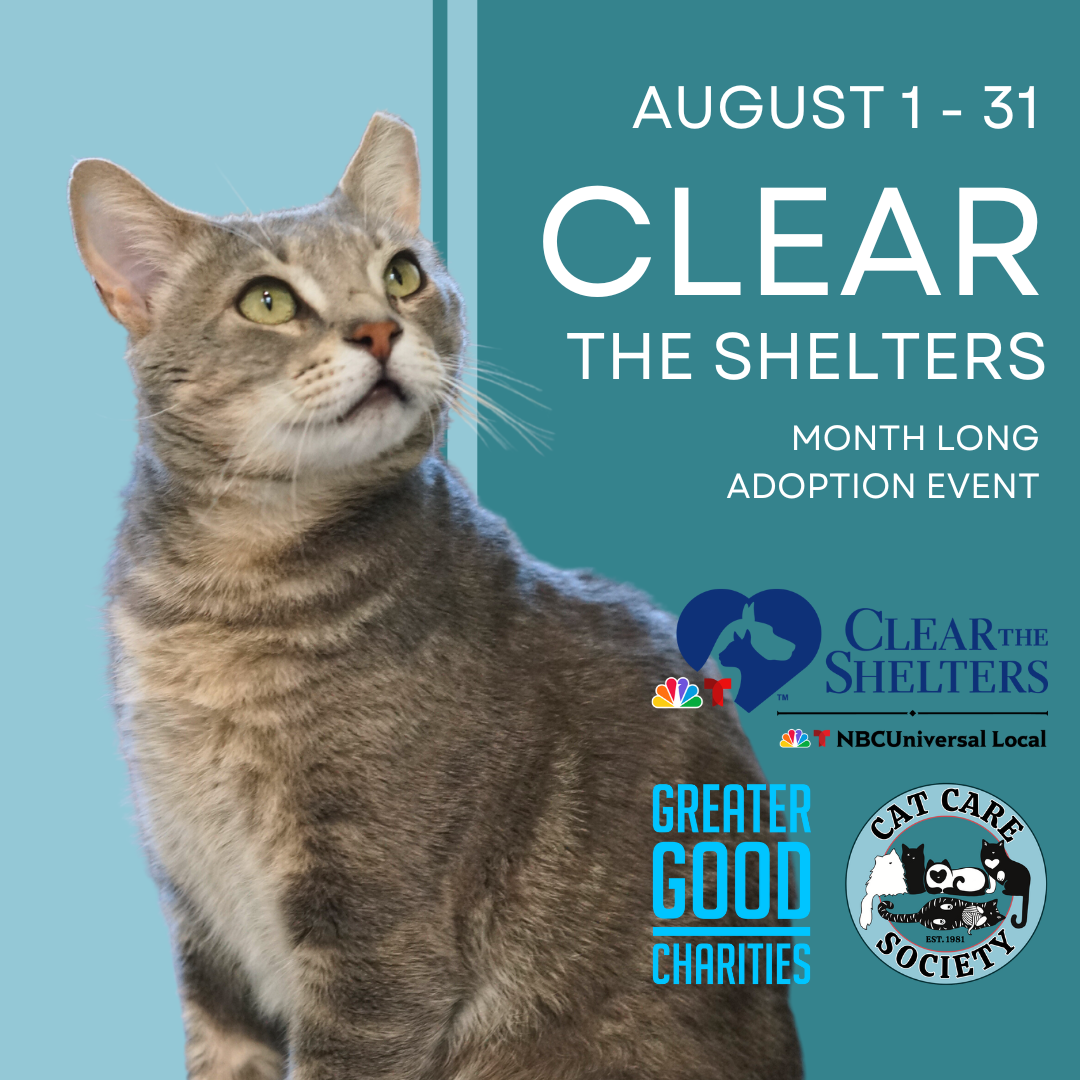
Free Adoption Event & Thrift Shop: Clear the Shelters
The Whisker Whisper Blog
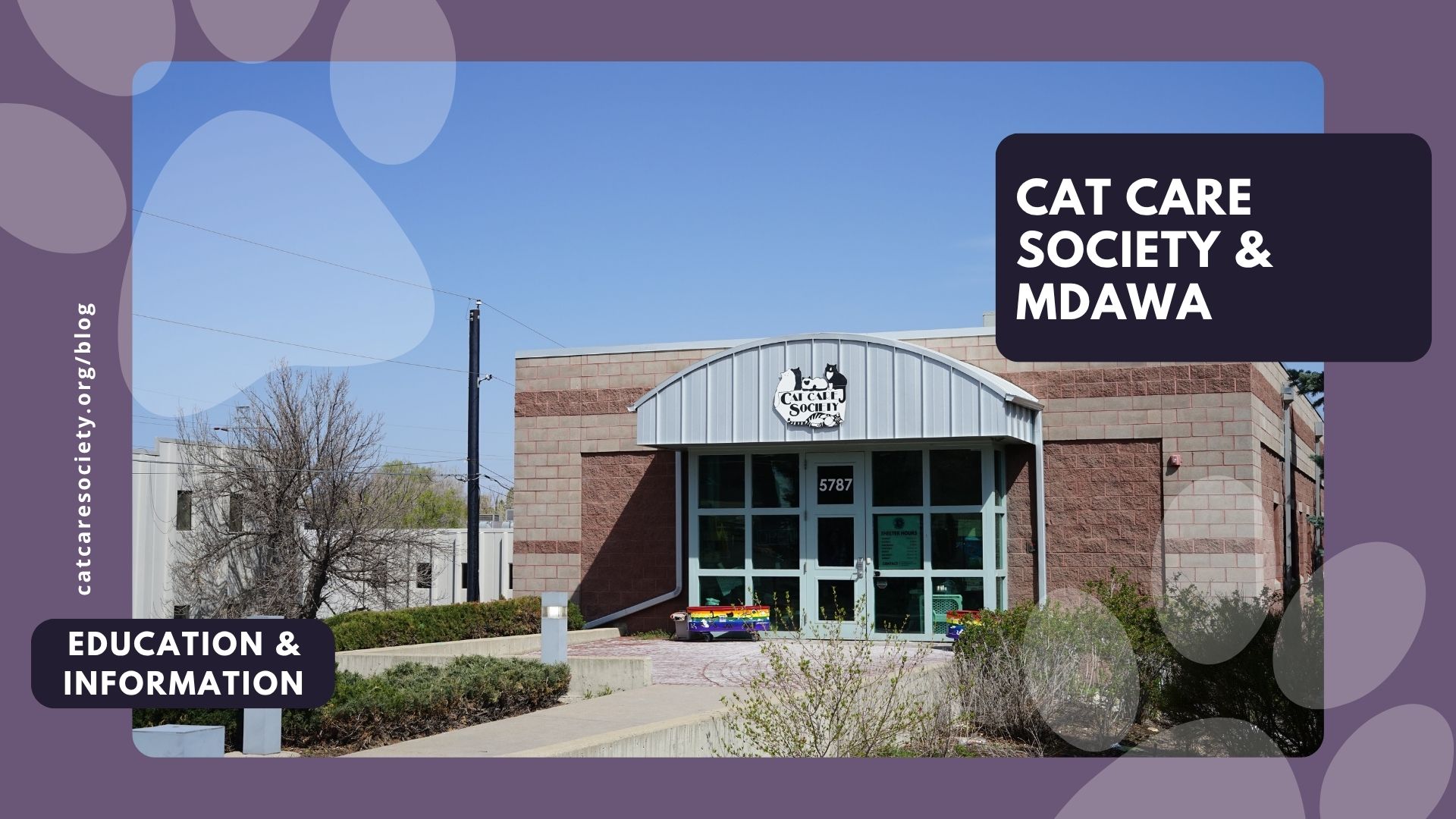
Cat Care Society and MDAWA
Cat Care Society is a proud member of MDAWA, the Metro Denver Animal Welfare Alliance. This coalition of 20+ local shelters, rescue groups, and animal service providers work together to promote humane care for companion animals in our community.
At Cat Care Society, collaboration with other shelters is imperative to our mission. Over half of the cats who come to our shelter are transferred from other shelters or rescues who don’t have the resources to support the needs of these special cats.
Ready to adopt a cat in need? Check out this helpful adoption guide from MDAWA (along with our answers!).
Before You Adopt a Pet: What to Know and Ask
Adopting from a Metro Denver Animal Welfare Alliance (MDAWA) Member Means Adopting with Confidence
Adopting a pet is one of the most rewarding decisions you can make—but it’s also a big commitment. Choosing the right adoption organization is just as important as finding the right animal. When you adopt from a member of the Metro Denver Animal Welfare Alliance (MDAWA), you’re supporting a network of organizations that are dedicated to ethical, compassionate, and community-focused animal welfare.
MDAWA members aren’t just placing pets—they’re committed to being your long-term partner. Here’s how they go above and beyond, and what to ask when you’re considering adoption.
Why Choose a MDAWA Member?
They’ll Be Your Long-Term Animal Welfare Partner
MDAWA organizations understand that adoption is just the beginning of your journey with a new pet. They offer resources and support to help adopters navigate any challenges that may come up after adoption—ensuring the best outcome for both you and your pet.
They Work with You to Make the Right Match
Rather than rushing the adoption process, MDAWA members take the time to make thoughtful, informed matches. They consider your preferences, lifestyle, experience, and the specific needs of the animal to help ensure a successful, lasting connection.
They Prioritize Animal Health and Wellness
All animals adopted through MDAWA organizations receive thorough medical care before adoption. This includes vaccinations, spay or neuter surgeries, and other needed veterinary treatment. They also provide behavioral support, so pets are set up for success in their new homes.
They Help the Most Vulnerable Local Animals
MDAWA members focus on protecting the Denver Metro area’s most vulnerable animals—those who are stray, surrendered, or at risk of homelessness—rather than bringing in only easily adoptable animals from out of state.
They Work Together to End Pet Homelessness
These organizations collaborate to provide a wide range of services that benefit the community, such as lost-and-found programs, low-cost veterinary care, spay/neuter clinics, and pet food pantries. By supporting a MDAWA member, you’re also supporting efforts to reduce the number of homeless animals in your neighborhood.
What to Ask Before You Adopt
When you’ve found a pet you’re interested in, it’s a good idea to ask the organization a few key questions to make sure you’re adopting from an ethical, responsible source. Here’s a checklist to guide you:
🩺 Pre-Adoption Care
- What is the pet’s history?
- Adopters will receive a full medical and behavioral history of the cat from their time in our shelter and any additional records we were able to secure from before the cat arrived at our facility.
- What vaccines has the pet received?
- CCS cats will have received their FERCP and Rabies vaccine, a dewormer, and topical antiparasitic treatment.
- Is the pet spayed or neutered?
- All CCS cats are spayed or neutered.
- Has the pet received any other medical care?
- Our adoption counselors can review medical history with the adopter. For cats with extensive or specialized medical needs, we may ask that you meet with our veterinarian for a more detailed review before completing adoption.
- Has the animal received any behavior support or had any behavior issues?
- Our adoption counselors can review behavioral history with the adopter.
💰 Adoption Fees
- What are the adoption fees?
- CCS adoption fees range from $50-200 depending on the age of the cat. We often have cats whose adoptions fees have been covered by a generous donor. HINT: When looking at adoptable cats on our website, sort by attributes>”I’ve been sponsored” to see which cats have a $0 adoption fee. We also offer discounts for seniors and active military/veterans.
- Do the fees include the cost of vaccinations, spay/neuter, and microchipping?
- Yes! At CCS, all cats are updated on current vaccinations, spayed/neutered, and microchipped before they go up for adoption.
🧭 Post-Adoption Support
- Do you offer resources or guidance if issues arise, such as medical or behavioral concerns?
- CCS has a thorough guide of resources in addition to lots of educational blogs available on our website.
- Are there any follow-ups for adopters to check in on how the pet is adjusting?
- Our adoption team will follow up a week after adoption to check in and see how your cat is adjusting to their new home. We encourage adopters to reach out with additional updates via the online form on our website.
- Do you offer any behavioral support or training classes?
- We offer free monthly classes with a cat behavior specialist at our facility.
🏠 Facility Experience
- Was the facility clean and well-maintained, with healthy animals?
- We maintain strict facility, cleaning, and medical protocols to provide a healthy environment for all cats in our care. We are a PACFA (Pet Animal Care and Facilities Act) Licensed Facility.
- Were staff members knowledgeable, friendly, and willing to answer your questions?
- Our staff is always happy to help!
📝 Policies & Contracts
- What is the return policy if the pet is not a good fit for your home?
- At CCS, we work with adopters as a partner and provide as much information as possible to ensure that the adoption is a great fit for both the cat and the adopter. We know that unforeseen circumstances can occur, and if you need to return your cat, we will always take back a CCS alumni cat.
- Will there be a written adoption contract confirming that you are the pet’s legal owner?
- Yes, you will complete an adoption contract online at the time of adoption.
🐾 Community Outreach
- Does the organization offer services like lost and found, low-cost vet care, spay/neuter clinics, or pet food pantries?
- CCS offers a pet food pantry twice a month at our location. We also have an extensive list of resources on our website to help pet parents in need.
- If not, do they collaborate with other local organizations that provide these services?
Adopt with Confidence
By carefully choosing where you adopt, you can ensure your new pet has been well cared for and is a good fit for your family. When you adopt from a MDAWA member, your decision not only changes a pet’s life—it also supports a network of organizations working together for ethical animal welfare across the Denver metro area.
Consider adopting your next pet from a MDAWA member.
Learn more about our mission and our members at mdawalliance.org/about
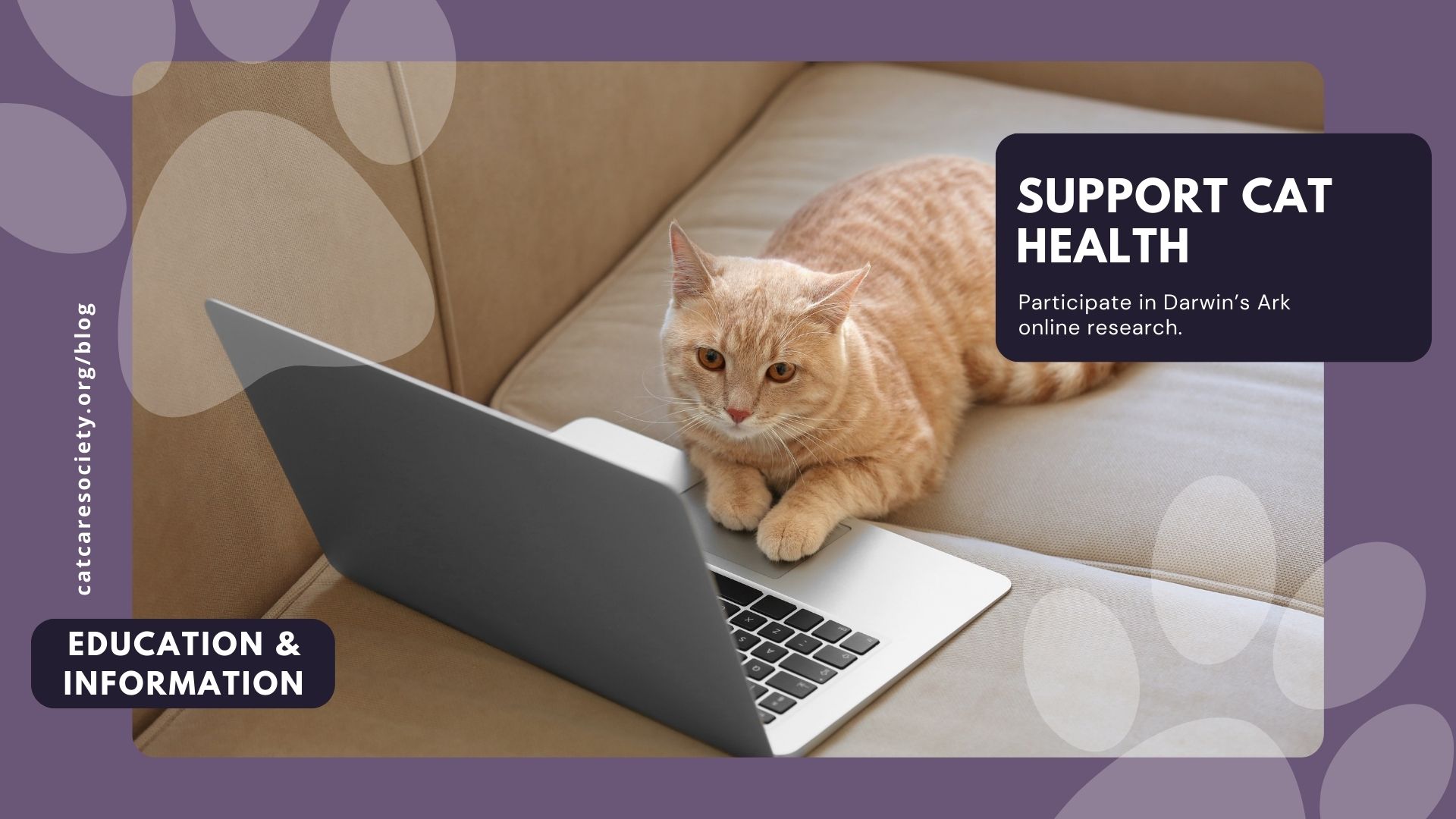
Support Cat Health: Participate in Darwin’s Ark Online Research
Let’s be honest—if you’re reading this, we probably don’t need to tell you how much joy cats bring into our lives. You already know the comfort of a purring cat in your lap, the entertainment of zoomies, and the simple calm of a cat sunbathing in a window. Cats are family.
But even though they’ve stolen our hearts (and our favorite spots on the couch), there’s still so much we don’t understand about their health. That’s where research comes in—and your participation can help in uncovering the mysteries behind feline wellness.
The Need for More Research on Cats
The health and wellbeing of cats often get overlooked in comparison to other pets like dogs. While research into canine health has flourished over the years, we’re only beginning to scratch the surface (pun intended) when it comes to understanding the unique needs and medical conditions of cats. From chronic illnesses like feline diabetes and kidney disease to behavioral issues such as anxiety and aggression, there are still many unanswered questions about what causes these conditions and how to best treat them.
To improve the lives of cats everywhere, we need more research. By deepening our understanding of how cats experience illness, aging, and stress, we can develop better treatments, prevention strategies, and care—helping them live longer, healthier, and happier lives.
Enter Darwin’s Ark: A Platform for Scientific Research
One exciting initiative that aims to fill this gap in feline research is Darwin’s Ark, an online platform started by two pet lovers, a geneticist and an engineer, to advance scientific understanding of pet health. The website is an invaluable resource for anyone passionate about improving the lives of both dogs and cats through data-driven research.
For our purposes, we’re focusing on cat health, and at its core, Darwin’s Ark is about collecting and analyzing data from real cats living in homes, shelters, and other environments. The goal is to create a comprehensive database that researchers can use to study genetic and environmental factors that influence cat health. By gathering data on everything from a cat’s breed and genetic makeup to its medical history and behaviors, Darwin’s Ark provides vital insights that can shape future research.
How You Can Contribute to Cat Health Research
The beauty of Darwin’s Ark is that it allows cat owners and shelters alike to play an active role in research. By participating in the program, you’re contributing valuable information that could lead to breakthroughs in veterinary science. Here’s how you can get involved:
- Register Your Cat: By signing up on Darwin’s Ark, you can submit data about your cat’s health, lifestyle, and behavior. This information can help create a broader picture of feline wellbeing and may reveal patterns or correlations that were previously unknown.
- Participate in Research Surveys: For each cat you register, there are ongoing surveys to complete related to the cat’s health, behavior, lifestyle, and more. By completing these surveys, you’ll be directly contributing to our understanding of cats. Most surveys just take 2-3 minutes!
- Sequence Your Cat’s DNA: Through Darwin’s Ark, you can pay for a genetic sequencing kit to sequence your cat’s DNA, which can help scientists uncover genetic links to cat physiology, behavior, ancestry, and risk factors for disease.
- Spread the Word: Even if you aren’t able to participate in the research yourself, you can still make a difference by sharing the platform with other cat lovers. The more data that’s collected, the more comprehensive the research will be! Additionally, you can also follow and share their news and research posted on Facebook and Instagram.
The Bigger Picture: How This Research Benefits All Cats
The research conducted through Darwin’s Ark has the potential to change the way we think about feline health. By looking at the genetic and environmental factors that influence cats’ lives, researchers can gain a better understanding of how diseases like cancer, heart disease, and even infectious illnesses develop in cats. This information will help veterinarians make more accurate diagnoses, prescribe better treatments, and ultimately improve the lives of cats.
But it’s not just about medical conditions. Research into feline behavior and mental health is equally important. Many cats suffer from anxiety, depression, or stress, often due to changes in their environment, lack of stimulation, or inadequate socialization. By understanding the root causes of these behavioral issues, we can develop strategies to create happier, more well-adjusted cats who can thrive in their homes.
Additionally, shelters can use the findings from these studies to provide better care for cats in their care. Whether it’s understanding how to better treat sick cats, providing more enrichment opportunities, or improving the adoption process, data-driven research will help shelters give cats the best possible chance at a healthy and fulfilling life.
Closing
In the grand scheme of things, supporting research into feline health is about more than just helping individual cats—it’s about ensuring that all cats, everywhere, can live longer, healthier lives. The more we know, the better we can protect and care for our kitty companions, whether they’re our beloved pets at home or shelter cats.
For more information or to get started, visit Darwin’s Ark today and be sure to check out their fascinating blog article on why cats are so understudied. By supporting platforms like Darwin’s Ark, we take a step toward making a tangible difference in the lives of cats, promoting better health outcomes, and advancing our understanding of these extraordinary animals. Every small contribution counts—whether it’s participating in research, sharing the word, or making a donation. Let’s work together to ensure that all cats can live their best lives.
About the Author: Beth Dokolasa is a volunteer for Cat Care Society and serves on the Board of Directors. She is an instructional developer for Natural Grocers and lives in Indian Hills, Colo., with her husband, daughter, and two cats, Techno and Digit.
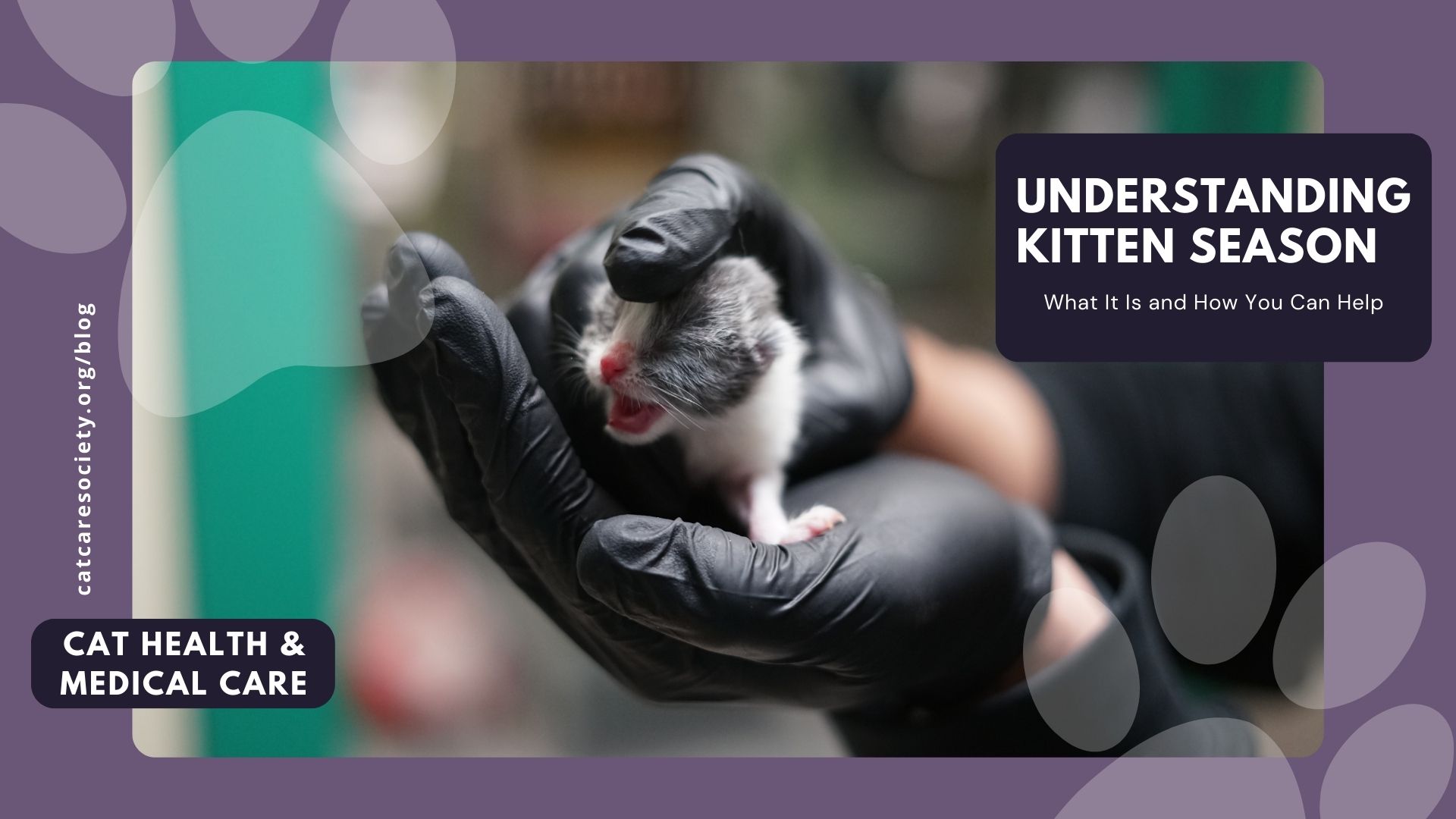
Understanding Kitten Season: What It Is and How You Can Help
If you love cats, you may have heard the term “kitten season” before—but what exactly does it mean? Kitten season is the time of year when shelters and rescues typically receive an influx of newborn kitten litters as well as their mothers. This surge in cats can create challenges for pet shelters, but with the right knowledge and support, everyone can play a part in helping shelters, ensuring the well-being of the cats, and finding them a loving home.
When Is Kitten Season?
Kitten season typically occurs from early spring through late fall, with a peak in the warmer months. During this time, unspayed female cats go into heat more frequently and have the potential to give birth to multiple litters, with an average of 4-6 kittens born per litter. This can really add up! Many of these kittens are born outdoors to feral or stray cats and end up in shelters or on the streets.
Why Is Kitten Season a Challenge?
While kittens are undeniably adorable, the large number arriving at shelters during kitten season creates a high demand for resources like medical care, food, and space. In Colorado, kittens cannot be adopted until they are two months old so shelters are providing lots of long term care for them! Shelters and rescue organizations work tirelessly to care for these kittens and their mothers, but they often face challenges like overcrowding and foster home shortages.
Foster homes help address space shortages but they also play a crucial role in keeping all cats healthy. Kittens don’t yet have a fully developed immune system or GI tract making them more vulnerable to catching and spreading illnesses, which can further overwhelm the shelter and impact other cats. Kittens do not begin to receive illness preventing vaccines until they are at least four weeks of age. Additionally, kittens require frequent monitoring, socialization, and specialized care, which can be challenging for shelters managing many animals at once. Foster caregivers help by providing individualized attention, ensuring kittens receive the care they need to grow strong and healthy before adoption.
To reduce the number of kittens in shelters and ease the ongoing pressure on resources, shelters also focus on spaying mother cats, preventing future litters. This helps break the cycle of overcrowding and ensures that shelters can better meet the needs of all the cats in their care. With community support—through fostering, adoption, and other forms of assistance—we can give every kitten the best chance at a healthy, happy future.
How You Can Help During Kitten Season
There are many ways you can make a difference during kitten season. Whether you’re able to adopt, foster, volunteer, or support from afar, every effort counts. Here are some suggestions:
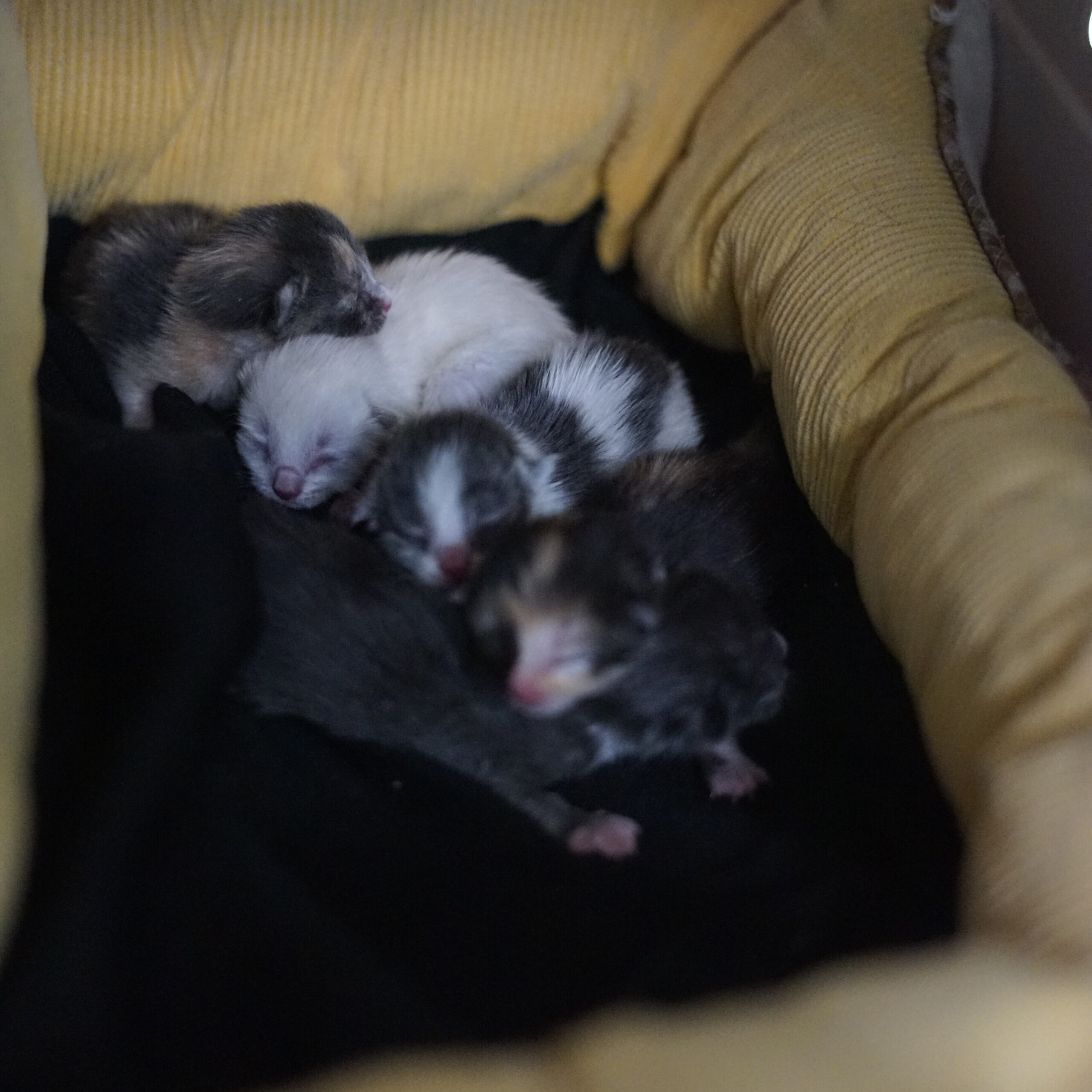
1. Become a Foster
Many shelters and rescues rely on foster homes to care for young kittens
who are too small to be adopted. These kittens need a safe and loving environment where they can grow, socialize, and receive proper medical care. Fostering is a rewarding experience and saves countless lives. Learn more about being a foster with Cat Care Society and apply online.
2. Spay and Neuter Your Pets
Preventing unwanted litters starts with responsible pet ownership. Ensure your own cats are spayed or neutered, and encourage friends and family to do the same. We have a resource list of lost-cost clinics that can help make this more accessible. Encourage your friends and family to read more about the benefits of spaying and neutering your cats in one of our other blog posts.
3. Adopt, Don’t Shop
If you’ve been thinking about welcoming a cat into your family, kitten season is an ideal time to adopt. Shelters are overflowing with kittens and adult cats looking for homes. We also suggest adopting two kittens at the same time so they can continue practicing great behavior habits! By adopting, you’re not only giving a cat a second chance but also freeing up space in shelters for other animals in need. Check out our cats available for adoption!
Cat Care Society has a robust in-house cat socialization and enrichment program, and we also have many great resources to help you bond with your new kitty once it’s home and set up an environment where your cat can play, express their natural behaviors, and thrive!
4. Trap-Neuter-Return (TNR)
One of the most effective ways to reduce the number of kittens born on the streets is through Trap-Neuter-Return (TNR). This humane approach involves trapping stray and feral cats, having them spayed or neutered, and then returning them to their outdoor colonies where they have adapted to live. TNR helps stabilize cat populations and prevents future litters from being born. Read more about TNR in one of our other blog posts and check out our list of TNR organizations that provide services in the Denver metro area if you’d like to get involved or need support.
5. Support Shelters and Rescues
Whether or not you can adopt or foster, there are plenty of ways to make a difference! Here are just a few ways you can help:
- Sponsor an adoption to encourage the adoption of a cat who have been in the shelter the longest or has the most urgent need to find their new family
- Donate supplies from our shopping wish lists or from our list of new or gently used cat items, especially during the busy kitten season! Kittens often require more medical care, specialty food, and other costly resources, so any kind of donation helps free up funds to meet these needs.
- Participate in King Soopers’ Community Giving Program, which awards non-profits like CCS with free money from your purchases at no extra cost to you!
- To get started, sign up for a free King Soopers loyalty account (or use your existing one) and designate CCS as your preferred charity. Then, simply swipe your card or enter your loyalty ID number every time you check out.
- Set up a one-time or recurring monthly financial donation and know that your donation will directly support the cats and achieve CCS’ mission to be a safe and enriching place for all cats on their journey to a loving home.
- For example, a monthly $25 donation pays for one neuter surgery, a monthly $100 donation covers a year of arthritis medication for six cats, and a $500 donation provides 20 days of care for a shelter cat.
- Check out other ways to contribute—we’re fortunate to have many easy and convenient ways for you to show your support.
6. Spread Awareness
EduCATion is key to supporting our cat population—it’s built right into the word! Share information about kitten season, TNR programs, and responsible pet ownership with your community. Social media, local events, and word-of-mouth can all help raise awareness and encourage others to get involved.
Follow us on Instagram, Facebook, and TikTok for helpful, shareable content. Sign up for our email newsletter, aka our Mewsletter, to stay updated on upcoming events, adoptable cats, must-read stories, and ways to support the shelter. We also publish a quarterly print newsletter called Cat Care Quarterly that you can sign up to receive at home for free!
Every Action Makes a Difference
Kitten season is a challenging time for shelters and rescues, but with community involvement, we can help save lives and reduce the number of homeless cats and overcrowded shelters. Whether you open your home to a cat in need, contribute supplies or funds, or simply spread the word, your support makes a meaningful impact. CCS is grateful to all of our supporters, including our dedicated volunteers, fosters, donors, adopters and beyond. Let’s continue working together to give kittens the best start in life and create a brighter, more hopeful future for all cats!
About the Author: Beth Dokolasa is a volunteer for Cat Care Society and served on the organization’s junior board. She is an instructional developer for Natural Grocers and lives in Indian Hills, Colo., with her husband, daughter, and two cats, Techno and Digit.

Cat Care Society and MDAWA
Cat Care Society is a proud member of MDAWA, the Metro Denver Animal Welfare Alliance. This coalition of 20+ local shelters, rescue groups, and animal service providers work together to promote humane care for companion animals in our community.
At Cat Care Society, collaboration with other shelters is imperative to our mission. Over half of the cats who come to our shelter are transferred from other shelters or rescues who don’t have the resources to support the needs of these special cats.
Ready to adopt a cat in need? Check out this helpful adoption guide from MDAWA (along with our answers!).
Before You Adopt a Pet: What to Know and Ask
Adopting from a Metro Denver Animal Welfare Alliance (MDAWA) Member Means Adopting with Confidence
Adopting a pet is one of the most rewarding decisions you can make—but it’s also a big commitment. Choosing the right adoption organization is just as important as finding the right animal. When you adopt from a member of the Metro Denver Animal Welfare Alliance (MDAWA), you’re supporting a network of organizations that are dedicated to ethical, compassionate, and community-focused animal welfare.
MDAWA members aren’t just placing pets—they’re committed to being your long-term partner. Here’s how they go above and beyond, and what to ask when you’re considering adoption.
Why Choose a MDAWA Member?
They’ll Be Your Long-Term Animal Welfare Partner
MDAWA organizations understand that adoption is just the beginning of your journey with a new pet. They offer resources and support to help adopters navigate any challenges that may come up after adoption—ensuring the best outcome for both you and your pet.
They Work with You to Make the Right Match
Rather than rushing the adoption process, MDAWA members take the time to make thoughtful, informed matches. They consider your preferences, lifestyle, experience, and the specific needs of the animal to help ensure a successful, lasting connection.
They Prioritize Animal Health and Wellness
All animals adopted through MDAWA organizations receive thorough medical care before adoption. This includes vaccinations, spay or neuter surgeries, and other needed veterinary treatment. They also provide behavioral support, so pets are set up for success in their new homes.
They Help the Most Vulnerable Local Animals
MDAWA members focus on protecting the Denver Metro area’s most vulnerable animals—those who are stray, surrendered, or at risk of homelessness—rather than bringing in only easily adoptable animals from out of state.
They Work Together to End Pet Homelessness
These organizations collaborate to provide a wide range of services that benefit the community, such as lost-and-found programs, low-cost veterinary care, spay/neuter clinics, and pet food pantries. By supporting a MDAWA member, you’re also supporting efforts to reduce the number of homeless animals in your neighborhood.
What to Ask Before You Adopt
When you’ve found a pet you’re interested in, it’s a good idea to ask the organization a few key questions to make sure you’re adopting from an ethical, responsible source. Here’s a checklist to guide you:
🩺 Pre-Adoption Care
- What is the pet’s history?
- Adopters will receive a full medical and behavioral history of the cat from their time in our shelter and any additional records we were able to secure from before the cat arrived at our facility.
- What vaccines has the pet received?
- CCS cats will have received their FERCP and Rabies vaccine, a dewormer, and topical antiparasitic treatment.
- Is the pet spayed or neutered?
- All CCS cats are spayed or neutered.
- Has the pet received any other medical care?
- Our adoption counselors can review medical history with the adopter. For cats with extensive or specialized medical needs, we may ask that you meet with our veterinarian for a more detailed review before completing adoption.
- Has the animal received any behavior support or had any behavior issues?
- Our adoption counselors can review behavioral history with the adopter.
💰 Adoption Fees
- What are the adoption fees?
- CCS adoption fees range from $50-200 depending on the age of the cat. We often have cats whose adoptions fees have been covered by a generous donor. HINT: When looking at adoptable cats on our website, sort by attributes>”I’ve been sponsored” to see which cats have a $0 adoption fee. We also offer discounts for seniors and active military/veterans.
- Do the fees include the cost of vaccinations, spay/neuter, and microchipping?
- Yes! At CCS, all cats are updated on current vaccinations, spayed/neutered, and microchipped before they go up for adoption.
🧭 Post-Adoption Support
- Do you offer resources or guidance if issues arise, such as medical or behavioral concerns?
- CCS has a thorough guide of resources in addition to lots of educational blogs available on our website.
- Are there any follow-ups for adopters to check in on how the pet is adjusting?
- Our adoption team will follow up a week after adoption to check in and see how your cat is adjusting to their new home. We encourage adopters to reach out with additional updates via the online form on our website.
- Do you offer any behavioral support or training classes?
- We offer free monthly classes with a cat behavior specialist at our facility.
🏠 Facility Experience
- Was the facility clean and well-maintained, with healthy animals?
- We maintain strict facility, cleaning, and medical protocols to provide a healthy environment for all cats in our care. We are a PACFA (Pet Animal Care and Facilities Act) Licensed Facility.
- Were staff members knowledgeable, friendly, and willing to answer your questions?
- Our staff is always happy to help!
📝 Policies & Contracts
- What is the return policy if the pet is not a good fit for your home?
- At CCS, we work with adopters as a partner and provide as much information as possible to ensure that the adoption is a great fit for both the cat and the adopter. We know that unforeseen circumstances can occur, and if you need to return your cat, we will always take back a CCS alumni cat.
- Will there be a written adoption contract confirming that you are the pet’s legal owner?
- Yes, you will complete an adoption contract online at the time of adoption.
🐾 Community Outreach
- Does the organization offer services like lost and found, low-cost vet care, spay/neuter clinics, or pet food pantries?
- CCS offers a pet food pantry twice a month at our location. We also have an extensive list of resources on our website to help pet parents in need.
- If not, do they collaborate with other local organizations that provide these services?
Adopt with Confidence
By carefully choosing where you adopt, you can ensure your new pet has been well cared for and is a good fit for your family. When you adopt from a MDAWA member, your decision not only changes a pet’s life—it also supports a network of organizations working together for ethical animal welfare across the Denver metro area.
Consider adopting your next pet from a MDAWA member.
Learn more about our mission and our members at mdawalliance.org/about

Support Cat Health: Participate in Darwin’s Ark Online Research
Let’s be honest—if you’re reading this, we probably don’t need to tell you how much joy cats bring into our lives. You already know the comfort of a purring cat in your lap, the entertainment of zoomies, and the simple calm of a cat sunbathing in a window. Cats are family.
But even though they’ve stolen our hearts (and our favorite spots on the couch), there’s still so much we don’t understand about their health. That’s where research comes in—and your participation can help in uncovering the mysteries behind feline wellness.
The Need for More Research on Cats
The health and wellbeing of cats often get overlooked in comparison to other pets like dogs. While research into canine health has flourished over the years, we’re only beginning to scratch the surface (pun intended) when it comes to understanding the unique needs and medical conditions of cats. From chronic illnesses like feline diabetes and kidney disease to behavioral issues such as anxiety and aggression, there are still many unanswered questions about what causes these conditions and how to best treat them.
To improve the lives of cats everywhere, we need more research. By deepening our understanding of how cats experience illness, aging, and stress, we can develop better treatments, prevention strategies, and care—helping them live longer, healthier, and happier lives.
Enter Darwin’s Ark: A Platform for Scientific Research
One exciting initiative that aims to fill this gap in feline research is Darwin’s Ark, an online platform started by two pet lovers, a geneticist and an engineer, to advance scientific understanding of pet health. The website is an invaluable resource for anyone passionate about improving the lives of both dogs and cats through data-driven research.
For our purposes, we’re focusing on cat health, and at its core, Darwin’s Ark is about collecting and analyzing data from real cats living in homes, shelters, and other environments. The goal is to create a comprehensive database that researchers can use to study genetic and environmental factors that influence cat health. By gathering data on everything from a cat’s breed and genetic makeup to its medical history and behaviors, Darwin’s Ark provides vital insights that can shape future research.
How You Can Contribute to Cat Health Research
The beauty of Darwin’s Ark is that it allows cat owners and shelters alike to play an active role in research. By participating in the program, you’re contributing valuable information that could lead to breakthroughs in veterinary science. Here’s how you can get involved:
- Register Your Cat: By signing up on Darwin’s Ark, you can submit data about your cat’s health, lifestyle, and behavior. This information can help create a broader picture of feline wellbeing and may reveal patterns or correlations that were previously unknown.
- Participate in Research Surveys: For each cat you register, there are ongoing surveys to complete related to the cat’s health, behavior, lifestyle, and more. By completing these surveys, you’ll be directly contributing to our understanding of cats. Most surveys just take 2-3 minutes!
- Sequence Your Cat’s DNA: Through Darwin’s Ark, you can pay for a genetic sequencing kit to sequence your cat’s DNA, which can help scientists uncover genetic links to cat physiology, behavior, ancestry, and risk factors for disease.
- Spread the Word: Even if you aren’t able to participate in the research yourself, you can still make a difference by sharing the platform with other cat lovers. The more data that’s collected, the more comprehensive the research will be! Additionally, you can also follow and share their news and research posted on Facebook and Instagram.
The Bigger Picture: How This Research Benefits All Cats
The research conducted through Darwin’s Ark has the potential to change the way we think about feline health. By looking at the genetic and environmental factors that influence cats’ lives, researchers can gain a better understanding of how diseases like cancer, heart disease, and even infectious illnesses develop in cats. This information will help veterinarians make more accurate diagnoses, prescribe better treatments, and ultimately improve the lives of cats.
But it’s not just about medical conditions. Research into feline behavior and mental health is equally important. Many cats suffer from anxiety, depression, or stress, often due to changes in their environment, lack of stimulation, or inadequate socialization. By understanding the root causes of these behavioral issues, we can develop strategies to create happier, more well-adjusted cats who can thrive in their homes.
Additionally, shelters can use the findings from these studies to provide better care for cats in their care. Whether it’s understanding how to better treat sick cats, providing more enrichment opportunities, or improving the adoption process, data-driven research will help shelters give cats the best possible chance at a healthy and fulfilling life.
Closing
In the grand scheme of things, supporting research into feline health is about more than just helping individual cats—it’s about ensuring that all cats, everywhere, can live longer, healthier lives. The more we know, the better we can protect and care for our kitty companions, whether they’re our beloved pets at home or shelter cats.
For more information or to get started, visit Darwin’s Ark today and be sure to check out their fascinating blog article on why cats are so understudied. By supporting platforms like Darwin’s Ark, we take a step toward making a tangible difference in the lives of cats, promoting better health outcomes, and advancing our understanding of these extraordinary animals. Every small contribution counts—whether it’s participating in research, sharing the word, or making a donation. Let’s work together to ensure that all cats can live their best lives.
About the Author: Beth Dokolasa is a volunteer for Cat Care Society and serves on the Board of Directors. She is an instructional developer for Natural Grocers and lives in Indian Hills, Colo., with her husband, daughter, and two cats, Techno and Digit.

Understanding Kitten Season: What It Is and How You Can Help
If you love cats, you may have heard the term “kitten season” before—but what exactly does it mean? Kitten season is the time of year when shelters and rescues typically receive an influx of newborn kitten litters as well as their mothers. This surge in cats can create challenges for pet shelters, but with the right knowledge and support, everyone can play a part in helping shelters, ensuring the well-being of the cats, and finding them a loving home.
When Is Kitten Season?
Kitten season typically occurs from early spring through late fall, with a peak in the warmer months. During this time, unspayed female cats go into heat more frequently and have the potential to give birth to multiple litters, with an average of 4-6 kittens born per litter. This can really add up! Many of these kittens are born outdoors to feral or stray cats and end up in shelters or on the streets.
Why Is Kitten Season a Challenge?
While kittens are undeniably adorable, the large number arriving at shelters during kitten season creates a high demand for resources like medical care, food, and space. In Colorado, kittens cannot be adopted until they are two months old so shelters are providing lots of long term care for them! Shelters and rescue organizations work tirelessly to care for these kittens and their mothers, but they often face challenges like overcrowding and foster home shortages.
Foster homes help address space shortages but they also play a crucial role in keeping all cats healthy. Kittens don’t yet have a fully developed immune system or GI tract making them more vulnerable to catching and spreading illnesses, which can further overwhelm the shelter and impact other cats. Kittens do not begin to receive illness preventing vaccines until they are at least four weeks of age. Additionally, kittens require frequent monitoring, socialization, and specialized care, which can be challenging for shelters managing many animals at once. Foster caregivers help by providing individualized attention, ensuring kittens receive the care they need to grow strong and healthy before adoption.
To reduce the number of kittens in shelters and ease the ongoing pressure on resources, shelters also focus on spaying mother cats, preventing future litters. This helps break the cycle of overcrowding and ensures that shelters can better meet the needs of all the cats in their care. With community support—through fostering, adoption, and other forms of assistance—we can give every kitten the best chance at a healthy, happy future.
How You Can Help During Kitten Season
There are many ways you can make a difference during kitten season. Whether you’re able to adopt, foster, volunteer, or support from afar, every effort counts. Here are some suggestions:

1. Become a Foster
Many shelters and rescues rely on foster homes to care for young kittens
who are too small to be adopted. These kittens need a safe and loving environment where they can grow, socialize, and receive proper medical care. Fostering is a rewarding experience and saves countless lives. Learn more about being a foster with Cat Care Society and apply online.
2. Spay and Neuter Your Pets
Preventing unwanted litters starts with responsible pet ownership. Ensure your own cats are spayed or neutered, and encourage friends and family to do the same. We have a resource list of lost-cost clinics that can help make this more accessible. Encourage your friends and family to read more about the benefits of spaying and neutering your cats in one of our other blog posts.
3. Adopt, Don’t Shop
If you’ve been thinking about welcoming a cat into your family, kitten season is an ideal time to adopt. Shelters are overflowing with kittens and adult cats looking for homes. We also suggest adopting two kittens at the same time so they can continue practicing great behavior habits! By adopting, you’re not only giving a cat a second chance but also freeing up space in shelters for other animals in need. Check out our cats available for adoption!
Cat Care Society has a robust in-house cat socialization and enrichment program, and we also have many great resources to help you bond with your new kitty once it’s home and set up an environment where your cat can play, express their natural behaviors, and thrive!
4. Trap-Neuter-Return (TNR)
One of the most effective ways to reduce the number of kittens born on the streets is through Trap-Neuter-Return (TNR). This humane approach involves trapping stray and feral cats, having them spayed or neutered, and then returning them to their outdoor colonies where they have adapted to live. TNR helps stabilize cat populations and prevents future litters from being born. Read more about TNR in one of our other blog posts and check out our list of TNR organizations that provide services in the Denver metro area if you’d like to get involved or need support.
5. Support Shelters and Rescues
Whether or not you can adopt or foster, there are plenty of ways to make a difference! Here are just a few ways you can help:
- Sponsor an adoption to encourage the adoption of a cat who have been in the shelter the longest or has the most urgent need to find their new family
- Donate supplies from our shopping wish lists or from our list of new or gently used cat items, especially during the busy kitten season! Kittens often require more medical care, specialty food, and other costly resources, so any kind of donation helps free up funds to meet these needs.
- Participate in King Soopers’ Community Giving Program, which awards non-profits like CCS with free money from your purchases at no extra cost to you!
- To get started, sign up for a free King Soopers loyalty account (or use your existing one) and designate CCS as your preferred charity. Then, simply swipe your card or enter your loyalty ID number every time you check out.
- Set up a one-time or recurring monthly financial donation and know that your donation will directly support the cats and achieve CCS’ mission to be a safe and enriching place for all cats on their journey to a loving home.
- For example, a monthly $25 donation pays for one neuter surgery, a monthly $100 donation covers a year of arthritis medication for six cats, and a $500 donation provides 20 days of care for a shelter cat.
- Check out other ways to contribute—we’re fortunate to have many easy and convenient ways for you to show your support.
6. Spread Awareness
EduCATion is key to supporting our cat population—it’s built right into the word! Share information about kitten season, TNR programs, and responsible pet ownership with your community. Social media, local events, and word-of-mouth can all help raise awareness and encourage others to get involved.
Follow us on Instagram, Facebook, and TikTok for helpful, shareable content. Sign up for our email newsletter, aka our Mewsletter, to stay updated on upcoming events, adoptable cats, must-read stories, and ways to support the shelter. We also publish a quarterly print newsletter called Cat Care Quarterly that you can sign up to receive at home for free!
Every Action Makes a Difference
Kitten season is a challenging time for shelters and rescues, but with community involvement, we can help save lives and reduce the number of homeless cats and overcrowded shelters. Whether you open your home to a cat in need, contribute supplies or funds, or simply spread the word, your support makes a meaningful impact. CCS is grateful to all of our supporters, including our dedicated volunteers, fosters, donors, adopters and beyond. Let’s continue working together to give kittens the best start in life and create a brighter, more hopeful future for all cats!
About the Author: Beth Dokolasa is a volunteer for Cat Care Society and served on the organization’s junior board. She is an instructional developer for Natural Grocers and lives in Indian Hills, Colo., with her husband, daughter, and two cats, Techno and Digit.
Open Hours
Tues–Weds: Closed
Sign up for our Mewsletter!
Shop Our Wishlists
Please include your full name on a gift note when sending donations through Amazon or Chewy, so we can properly acknowledge your generous contribution! Without it, we won’t be able to identify that the items are from you. Also, please keep your shopping receipt, as it serves as your official donation receipt.
